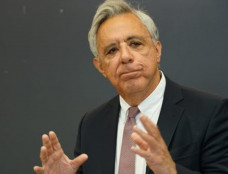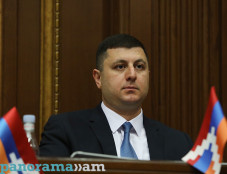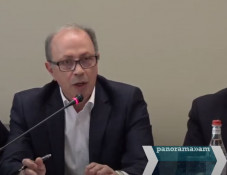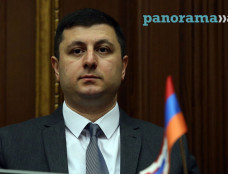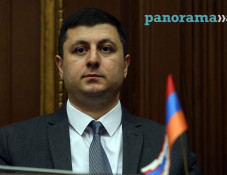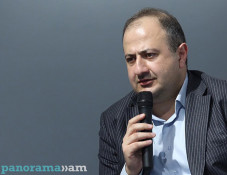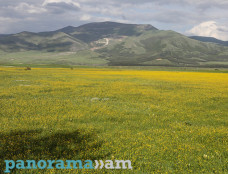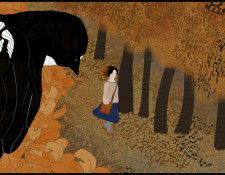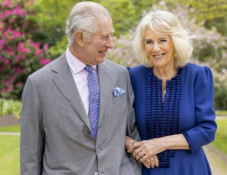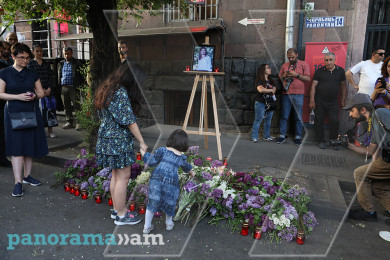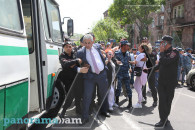
Millions at fatal risk as Fukushima radiation poisons Pacific
Nuclear regulators on Friday called on Japan’s plant operator TEPCO to address rising radiation levels near the crippled Fukushima reactors that have jumped to 7.8 millisieverts, causing a great deal of panic across the Pacific. TEPCO has attributed this rise to radiation emitted from tanks storing contaminated water, which is generated in the process of cooling the damaged reactors. The Voice of Russia has talked to Professor Chris Busby, Scientific Secretary of the European Committee on Radiation Risk and a member of the UK Department of Health Committee Examining Radiation Risk for Internal Emitters (CERRIE), who says he doesn’t believe this explanation. In his opinion, such high amounts of radiation can only come from materials that are already outside the tanks.
- How dangerous is the current radiation level of 7.8 millisieverts for humans?
- If it were caused by the explanation that TEPCO have given then it would not, in my opinion, represent a very great hazard. But I don’t believe their explanation. I’ve done calculations myself, which show that it’s almost impossible for this kind of dose to occur within a reasonable distance of about 10 meters from the radioactive tanks on the basis of the fact that strontium-90 is inside the tanks. So what I think the 7.8 mSv represent is it represents measurements that are of beta-radiation and gamma-radiation that are coming from materials that are already outside the tanks, and that is basically in the ground. And this is very, very dangerous because it actually represents a contamination of the ground of about 250 becquerelsper square meter. That’s 250,000 disintegrations per second per square meter. And that comes from material that can be inhaled due to resuspension, where it can get into people in various other ways. That represents a very serious hazard.
- According to the operator’s report the radiation level at the Fukushima plant was 8 higher than norm back in August. Isn’t it strange that the Japanese authorities have urged the company to take measures only now?
- This whole procedure has been dogged by arguments between various people in the government and various people in nuclear industry and so on. So I imagine this is just a consequence of a lot of arguments between various sides of the issue and the nuclear industry people and the government people. Eventually, it was the government people who have won. That’s why it has taken them so long for some remark like this to be made. I mean I would guess it’s entirely political, it has nothing to do with reality.
- But do you think that TEPCO’s clean-up activities are effective enough? Are they doing enough right now?
- I don’t think there’s much more they can do, to be honest. I think the thing is out of control, and I can’t see what they can do. Basically, what we have here, in my opinion and others too, is that the core material from the reactors is outside of the containment and in the ground, so the ground water is picking up this radioactivity and bringing it onto the surface. Of course, they are taking as much ground water as they can – this contaminated water – and pumping it into tanks to store it. But until they actually address the basic problem of this stuff being outside the containment then there’s not much they can do. They can attempt to clean up the stuff that is in the tanks – and it itself will be a quite complicated business – but as for the stuff that is outside the tanks in the ground, I’m not sure I see any way in which they can do it.
- Rather than being in the ground, I think that the Japanese have admitted to releasing 400 metric tons of water into the Pacific Ocean I think on a daily basis since the tsunami and the whole situation occurred. That’s three years and 400 metric tons. Does it coincide with figures that you have?
- Yes, and also, of course, there’s the amount of material that blew out to sea and ended up in the Pacific right at the beginning, and so this is an ongoing problem. So you have enormous amounts of radioactivity in the Pacific from the beginning and then an ongoing very large quantity – probably about the same amount eventually – being pumped out into the Pacific all the time. And this is in fact affecting the Pacific biotope. I mean there’s lots of evidence now that there’s a complete crush in the life forms. We are seeing lots and lots of evidence for this. And this is really quite terrifying. This is having an effect on Pacific life. And, of course, Pacific life is the source of food for a very large number of people inside East Asia and elsewhere.
- Can we talk about the risks? Who exactly is at risk? Where does the risk come from? I mean starting from Japan and going out to the Pacific Ocean, people who consume the fish that is in the sea. How many people are really at risk?
- Most of the risk, in my opinion, is confined to Japan. The concentrations of radionuclides, which are going to the Pacific or have been injected to the Pacific, by the time they get to the US, and to China and to South East Korea and so on will not be enormously high. I’m not saying that it is great, I mean there will be some risk to these people, and particularly the risk is from ingestion of radionuclide particles and not so much from the dilute stuff, the stuff that is in solution. But the main risk will be to the people of Japan, and it’ll be people who live along the coastline of Eastern Japan who will be greatly at risk. It’s within one kilometer from the sea. I did some calculations which suggest that just in terms of cancer there’ll probably be about 400-800 extra cancers in Japan in the next fifty years as the consequence of this. It will be absolutely measurable. The nuclear industry says it cannot be measured over the background rate, but it will be certainly measurable. We’ve already seen some effects in infant mortality and thyroid cancer in Japan. So I think this is just going to get worse. I think we are going to see a major effect on the general health of the Japanese population in Northern Japan. It’s going to be quite measurable. There’s going to be a decrease in the birth rate and an increase in the death rate.
- You don’t feel there’s a risk to people who are dependent on food from the Pacific, if we talk about food chain and the way that the contamination becomes more concentrated as the smaller fish is eaten by a larger fish that lives for quite some time and you end up with the tuna that is not only full of mercury but is also radioactive? I mean should we be concerned as consumers about buying fish from those places?
- I think people will generally stop buying fish from the Pacific. I actually don’t think the risk is as much as people have thought in terms of fish, because we have studied people who eat fish from the Irish Sea and from the Baltic Sea, which is very contaminated following Chernobyl. We roughly know what is going on there. The point about these radionuclides is when you ingest them they go to the gut, and a large proportion of the really serious ones – plutonium and uranium – don’t get across the gut. The main source of danger is inhalation of sea spray and inhalation of resuspended sediment, because once they get into the lungs, they don’t have this barrier that they had in the gut, so they go straight into the lymphatic system and can get anywhere.
Newsfeed
Videos





